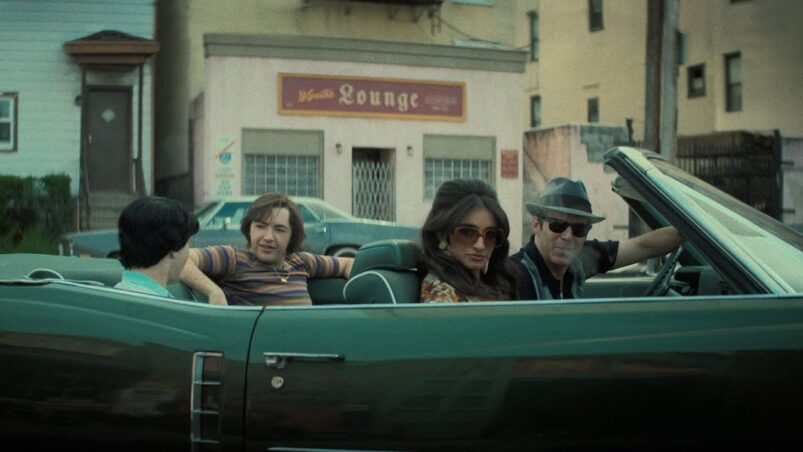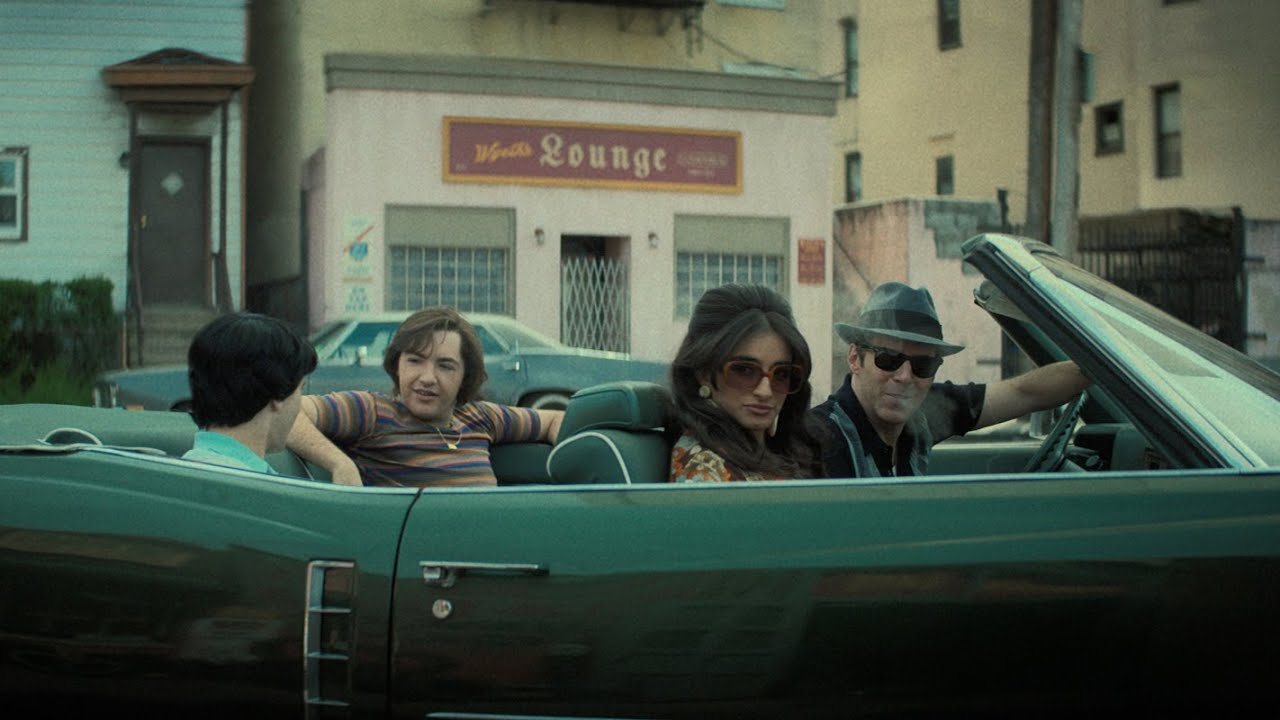When you think of the great mob films, you think iconic opening scenes. The Godfather’s “I believe in America” slow reveal, Goodfellas’ eerie “I always wanted to be a gangster” – these have gone down in cultural history, and rightly so. The Many Saints Of Newark spends its opening scene reconciling itself with the TV show from which it was spun off.
While being an adaptation of a lengthy HBO show is The Many Saints Of Newark’s whole raison d’etre, it’s also something which often weighs it down with cement shoes. There is simply too much ground to cover in one two-hour film, not to mention too many characters needing a look in. Given the volume of source material they had to work with, you have to wonder what the cutting room floor looked like after they were done.
In particular, its main structure has its feet in three camps – one telling the story of the young Tony Soprano (Michael Gandolfini, doing his best to take up his father’s mantle), one of the rise of Newark’s African-American gangs, and one telling the story of Dickie Moltisanti. The latter is obviously our centrepiece, Dickie’s clearly our main character, so devoting so much time to little Tony and Leslie Odom Jr.’s rising star on top of that all sits slightly awkwardly.
If there’s any show you wouldn’t expect to take another bite at the apple with a film spinoff (looking at you, Breaking Bad’s unnecessary El Camino) it’s The Sopranos. And especially not a prequel – though given the way it left off, a sequel was certainly out of the question. Early on in The Sopranos, we had Tony musing that he’d come into the Mafia well after the golden years, and then David Chase spent eighty hours illustrating the sheer petty awfulness of La Cosa Nostra, so how much can The Many Saints Of Newark be expected to add?
Still, the fans will be pleased – of course they will. Not least because The Many Saints Of Newark sets about recreating all the moments from the past which the show referred to, as if ticking them off a checklist, and especially the ones which have become memes. If you stick your head round the door of a Sopranos fan group, you’ll be bombarded with people telling you that you never had the makings of a varsity athlete. And so it’s basically in that spirit that at least one classic line from the show here becomes a bit of a catchphrase.
There’s a Mitchell and Webb sketch where their lazy screenwriter characters are doing what is obviously the 2011 Margaret Thatcher biopic The Iron Lady, and note “when you’re writing something set in the past, you can make lots of references to things that you know are going to happen…it makes you look really clever and witty without actually having to do a joke”. There, it manifests itself as “Oh, I don’t know, Denis, sometimes I just worry that there will be a leadership challenge, about 1990…” – and here it’s the infant Chris Moltisanti magically knowing who he’ll have cause to fear in later life.
At times, The Many Saints Of Newark can seem worryingly like a series of these fun little cameos strung together (hey, there’s young Paulie! Hey, there’s young Pussy! Hey, there’s…and so on). Part of that is, again, because it’s a naturally more expansive style of storytelling squished down into a two-hour window. So, inevitably, some plot developments feel slightly rushed, and others – thankfully, less important ones – are given short thrift.
And if the film was simply this, a series of skits and little winks to canon, then I would have damned it as not really being a film at all, just a curiosity for the hardcore fans and a reason to tell David Chase “look, don’t worry about it, you can’t win them all”.
But make no mistake, this is a Sopranos story. The gangland glitz, and low-comedy yuks, all serve to sugar the pill of what is fundamentally a tragedy. No spoilers here – it is, by nature, a tragedy, even without giving away any plot points we already know it’s the origin story of sociopathic mob boss Tony Soprano, a man who made a living by hurting and killing people. It’s certainly not a light romantic comedy or screwball farce.
(This is also a core aspect of The Godfather, which too often goes unremarked upon – beneath the tuxedos it’s the story of a man becoming evil.)
Perhaps the highest praise I can offer it is that it can stand alone. El Camino would have been largely incomprehensible to those who weren’t coming at it off the back of Breaking Bad (and if you want to be unkind, still pretty murky for those who were). But for the most part, The Many Saints Of Newark gets this right, and could plausibly work as a self-contained unit, even if God knows being familiar with The Sopranos will add a lot.
About the one thing newcomers will be missing out on – and really, how many of them are there going to be? – is what the original show told us about Dickie Moltisanti. Because it’s this chronologically later legend that the film is playing with throughout. How much do we really know about the man? It’s a pertinent question, given that a lot of the film’s charm for the fans will be to spend more time with people they know like family.
By nature, the man is something less than the legend – that’s how legends work. And, while I’m still trying to avoid spoilers, the legend is something you will not get here. There’s some big, sexy scenes of extreme violence, of course there are, but anyone hoping for a tale of über-gangster Dickie Moltisanti bouncing around, showing the young Tony Soprano how to shake down innocent suckers, will be disappointed.
That’s likely by design. The Sopranos, after all, famously ended on one of the most deliberately frustrating scenes of any media ever. And The Many Saints Of Newark made a great deal of the Newark Riots of ‘67 in its trailer, knowing full well that for a certain portion of the fans – what used to be called the “hits ‘n’ tits” crowd – this would suggest scenes of Dickie and Tony back to back, shooting people in New Jersey’s hour of chaos, and looking so cool as they do it.
Instead, underneath the pee-wee versions of beloved characters and the ‘60s period backdrop, the film is ultimately about Dickie, the flawed man. This, after all, was the main selling point of The Sopranos – a deeply, perhaps inherently flawed man, who nonetheless struck a chord with practically all the average-Joe TV-users out there.
Alessandro Nivola obviously doesn’t get the screentime as lead here that James Gandolfini racked up once upon a time (again, eighty hours versus a mere two). Yet he still takes us on a journey, one which isn’t quite a full-on Greek tragedy because of the sheer pettiness in play. And his, too, is one of warts and all, where we are compelled to watch despite – or because of? – his faults.
This, too, is something The Sopranos made much of – people’s petty, quibbling, un-dramatic nature, what it liked to call ‘the regularness of life’. Obviously there’s nothing all that regular about being a gangster, in Newark, in the ‘60s. But if you prick them, they still bleed.
READ NEXT: 10 Best Bottle Episodes of TV Shows
Some of the coverage you find on Cultured Vultures contains affiliate links, which provide us with small commissions based on purchases made from visiting our site.


